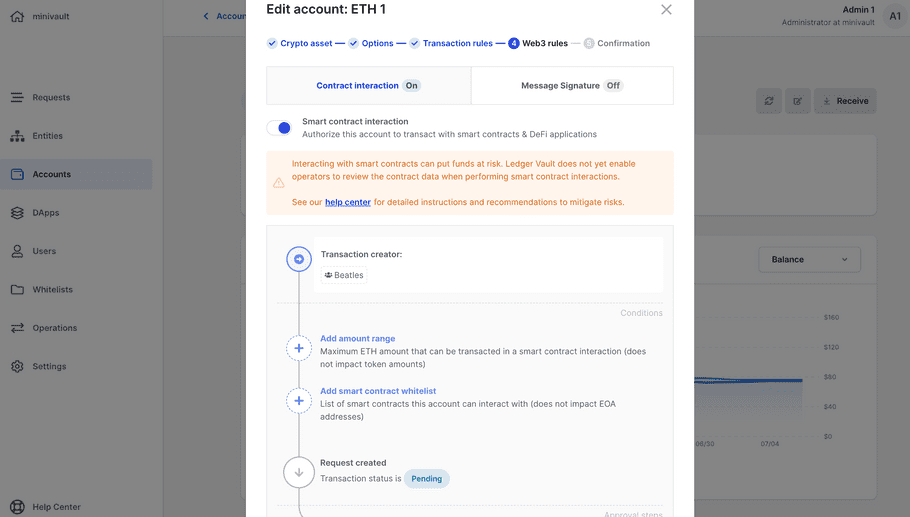Enable Smart Contract Interactions on EVM accounts
Overview
Smart contracts are autonomous programs running on Ethereum & other EVM blockchains. Smart contracts are the technology underlying decentralized finance (DeFi), non-fungible tokens (NFTs), and many more decentralized applications (DApps).
To interact with a smart contract, user accounts submit specific transactions that execute a function defined on the smart contract, such as a token mint function on an NFT contract, or a token swap function on a Decentralized Exchange (DEX) contract.
You can enable smart contract interactions for any Ethereum or EVM account (Polygon, BSC, etc.). The step 4 web3 rules of the account creation or edition procedure now lets you activate and configure a rule to govern smart contract interactions for the account. Activate the feature by clicking on the Toggle button, and configure your Smart Contract governance rule according to your needs.
- Select creator to define which operators can create smart contract transactions. You can select up to 20 operators or a single group.
- (optional) Click Add amount range . Note that the Amount parameter only applies to the amount of crypto you are sending to the contract. It does not impact the ERC20 token amounts transferred to or from your account due to the smart contract interaction
-
(optional) Click
Add whitelist
to restrict interactions to whitelisted smart contracts which you trust. You can select up to four smart contract whitelists from the drop-down. Then, click
Add whitelist
to confirm.
- Only whitelists of the Smart Contract type are listed. Note that if a DApp contract is not included in any of the selected whitelists, operators won’t be able to interact with the DApp. This is also true for ERC20 token contracts.
- Note that Whitelists pending creation or edition approvals aren't listed.
-
Use the approval workflow section to define which Operators must review and approve smart contract interactions created in the account. You can define up to three steps.
- Click Add approval step .
- Select up to 20 Operators or a single group.
- Operators and groups pending to be created, edited, or deleted aren't listed.
-
Click the chevrons

 to define the number of approvals required from these Operators.
to define the number of approvals required from these Operators.
- Click Add approval step .
- Confirm the creation of your Smart Contract Interaction rule and review the rule on your Personal Security Device. Once all required Administrators have reviewed and approved the account creation or edition request, according to your workspace's admin rule , the Smart Contract Interaction rule will be effective for the account.
General best practices
- Do not enable Smart Contract Interactions for an account holding higher amounts of funds than what you intend to use with Smart Contracts.
- Try segregating Smart Contract accounts with one account per smart contract or DApp you wish to interact with. For example
- One account dedicated to Paraswap trading, which you top up before trades and withdraw from after trades
- One account dedicated to ETH liquid staking on Lido
- One account dedicated to to NFT trading on NFT marketplaces
- Although Vault DApps features smart contracts which have been audited by multiple independent third-party firms, we encourage you to carry out your own due diligence before interacting with any smart contract.
